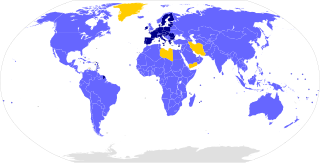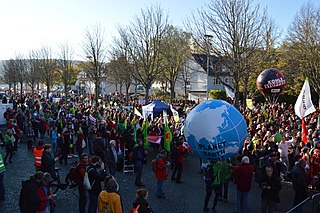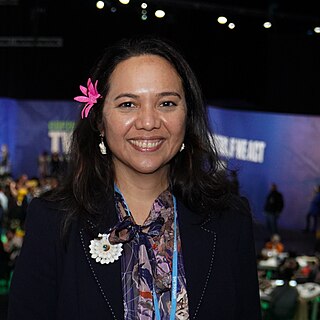Related Research Articles

The Convention on Biological Diversity (CBD), known informally as the Biodiversity Convention, is a multilateral treaty. The Convention has three main goals: the conservation of biological diversity ; the sustainable use of its components; and the fair and equitable sharing of benefits arising from genetic resources. Its objective is to develop national strategies for the conservation and sustainable use of biological diversity, and it is often seen as the key document regarding sustainable development.

The International Maritime Organization is a specialised agency of the United Nations responsible for regulating shipping. The IMO was established following agreement at a UN conference held in Geneva in 1948 and the IMO came into existence ten years later, meeting for the first time in 1959. Headquartered in London, United Kingdom, IMO currently has 175 Member States and three Associate Members.

Flag of convenience (FOC) is a business practice whereby a ship's owners register a merchant ship in a ship register of a country other than that of the ship's owners, and the ship flies the civil ensign of that country, called the flag state. The term is often used pejoratively, and although common, the practice is sometimes regarded as contentious.
HAC may refer to:

The Paris Agreement, often referred to as the Paris Accords or the Paris Climate Accords, is an international treaty on climate change. Adopted in 2015, the agreement covers climate change mitigation, adaptation, and finance. The Paris Agreement was negotiated by 196 parties at the 2015 United Nations Climate Change Conference near Paris, France. As of September 2022, 194 members of the United Nations Framework Convention on Climate Change (UNFCCC) are parties to the agreement. Of the four UNFCCC member states which have not ratified the agreement, the only major emitter is Iran. The United States withdrew from the Agreement in 2020, but rejoined in 2021.

The United Nations Climate Change Conferences are yearly conferences held in the framework of the United Nations Framework Convention on Climate Change (UNFCCC). They serve as the formal meeting of the UNFCCC parties to assess progress in dealing with climate change, and beginning in the mid-1990s, to negotiate the Kyoto Protocol to establish legally binding obligations for developed countries to reduce their greenhouse gas emissions. Starting in 2005 the conferences have also served as the "Conference of the Parties Serving as the Meeting of Parties to the Kyoto Protocol" (CMP); also parties to the convention that are not parties to the protocol can participate in protocol-related meetings as observers. From 2011 to 2015 the meetings were used to negotiate the Paris Agreement as part of the Durban platform, which created a general path towards climate action. Any final text of a COP must be agreed by consensus.
The Majuro Declaration is an initiative of the Pacific Islands Forum, which was signed on 5 September 2013 at Majuro in the Marshall Islands during the 44th Pacific Islands Forum summit. At the summit the leaders of the Pacific Islands Forum nations recognised the need for strengthened national systems to plan for, access, deliver, absorb and monitor climate change and for donor countries to continue to simplify and harmonise their assessment, implementation and reporting processes for financing projects directed to climate change adaptation, mitigation and risk reduction.

The 2015 United Nations Climate Change Conference, COP 21 or CMP 11 was held in Paris, France, from 30 November to 12 December 2015. It was the 21st yearly session of the Conference of the Parties (COP) to the 1992 United Nations Framework Convention on Climate Change (UNFCCC) and the 11th session of the Meeting of the Parties (CMP) to the 1997 Kyoto Protocol.
The Climate Summit 2014 was a meeting on climate change in New York on September 23, 2014. UN Secretary-General Ban Ki-moon announced it in September 2013 and invited leaders of governments, the private sector, and civil society to unite in taking concrete action towards a low-carbon emission world.

The 2016 United Nations Climate Change Conference was an international meeting of political leaders and activists to discuss environmental issues. It was held in Marrakech, Morocco, on 7–18 November 2016. The conference incorporated the twenty-second Conference of the Parties (COP22), the twelfth meeting of the parties to the Kyoto Protocol (CMP12), and the first meeting of the parties to the Paris Agreement (CMA1). The purpose of the conference was to discuss and implement plans about combatting climate change and to "[demonstrate] to the world that the implementation of the Paris Agreement is underway". Participants work together to come up with global solutions to climate change.

The 2017 United Nations Climate Change Conference (COP23) was an international meeting of political leaders, non-state actors and activists to discuss environmental issues. It was held at UN Campus in Bonn, Germany, during 6–17 November 2017. The conference incorporated the 23rd Conference of the Parties to the United Nations Framework Convention on Climate Change (UNFCCC), the thirteenth meeting of the parties for the Kyoto Protocol (CMP13), and the second session of the first meeting of the parties for the Paris Agreement.
The Talanoa Dialogue was a process designed to help countries implement and enhance their Nationally Determined Contributions by 2020. The Dialogue was mandated by the Parties to the United Nations Framework Convention for Climate Change to take stock of the collective global efforts to reduce the emissions of greenhouse gases, in line with the goals of the Paris Agreement, which is to limit the rise in average global temperature to 2°C above pre-industrial levels, and to pursue efforts to limit the increase to 1.5°C.
The 2018 United Nations Climate Change Conference, more commonly referred to as the Katowice Climate Change Conference or COP24, was the 24th Conference of the Parties to the United Nations Framework Convention on Climate Change. It was held between 2 and 15 December 2018 in Katowice, Poland. The conference was held in the International Congress Centre. The president of COP24 was Michał Kurtyka. The conference also incorporated the fourteenth meeting of the parties for the Kyoto Protocol (CMP14), and the third session of the first meeting of the parties for the Paris Agreement which agreed on rules to implement the Agreement. The conference's objective was to have a full implementation of the Paris agreement.
The history of climate change policy and politics refers to the continuing history of political actions, policies, trends, controversies and activist efforts as they pertain to the issue of global warming and other environmental anomalies. Dryzek, Norgaard, and Schlosberg suggest that critical reflection on the history of climate policy is necessary because it provides 'ways to think about one of the most difficult issues we human beings have brought upon ourselves in our short life on the planet’.
Farhana Yamin is a British lawyer, public speaker and climate activist.

Sustainable Development Goal 13 is about climate action and is one of 17 Sustainable Development Goals established by the United Nations General Assembly in 2015. The official mission statement of this goal is to "Take urgent action to combat climate change and its impacts". SDG 13 has five targets which are to be achieved by 2030. They cover a wide range of issues surrounding climate action. The first three targets are "output targets": Strengthen resilience and adaptive capacity to climate-related disasters; integrate climate change measures into policies and planning; build knowledge and capacity to meet climate change. The remaining two targets are "means of achieving" targets: To implement the UN Framework Convention on Climate Change; and to promote mechanisms to raise capacity for planning and management. Along with each target, there are “indicators” that provide a method to review the overall progress of each target, along with SDG 13 as a whole. The United Nations Framework Convention on Climate Change (UNFCCC) is the primary international, intergovernmental forum for negotiating the global response to climate change.
Climate TRACE is an independent group which monitors and publishes greenhouse gas emissions within weeks. It launched in 2021 before COP26, and improves monitoring, reporting and verification (MRV) of both carbon dioxide and methane.

The Initial IMO Strategy on the reduction of GHG emissions from ships, or Initial IMO GHG Strategy, is the framework through which the International Maritime Organization (IMO) aims to reduce greenhouse gas (GHG) emissions from international maritime shipping. GHG emissions from shipping are about 3% of total GHG emissions, and under this strategy the IMO envisions their elimination within this century. However many companies and organizations say shipping should be decarbonized by 2050.

Tina Stege is the Climate Envoy for the Marshall Islands (RMI). The RMI is one of the countries in the world most vulnerable to climate change, mainly as a result of rising sea levels. Among other meetings, Stege has represented her country at the 2019 United Nations Climate Change Conference (COP25) held in Madrid, Spain, the 2021 Conference (COP26) held in Glasgow, Scotland and the 2022 Conference (COP27) held in Sharm El Sheikh, Egypt. She has also been a spokesperson for the RMI on the impacts of nuclear testing.
References
- ↑ "A call for the High Ambition Coalition to work its magic on ICAO climate action". carbonmarketwatch.org.
{{cite web}}: CS1 maint: url-status (link) - ↑ Sutter, John D. (13 December 2018). "Can a coalition of 'superheroes' save the COP24 climate talks?". CNN. Retrieved 29 November 2022.
- ↑ "HAC Rallies for 1.5 and a Loss & Damage Fund in Final Push at COP". The High Ambition Coalition. Retrieved 29 November 2022.
- ↑ "Global warming target dispute leaves UN climate deal in the balance". Financial Times. 19 November 2022. Retrieved 29 November 2022.
- ↑ "Is this our last chance to act on the climate crisis?". the Guardian. 30 October 2021. Archived from the original on 1 November 2021. Retrieved 2 November 2021.
- ↑ "About". High Ambition Coalition. Retrieved 27 June 2022.
The HAC coordinates closely with the Shipping High Ambition Coalition within the International Maritime Organization as well as the High Ambition Coalition for Nature and People, focused on ambition in the Convention for Biological Diversity, and the High Ambition Coalition to End Plastic Pollution.
- ↑ "High ambition coalition! Are you joking?". www.downtoearth.org.in. Archived from the original on 23 August 2019. Retrieved 23 August 2019.
- ↑ "Countries | Climate Action Tracker". climateactiontracker.org. Archived from the original on 2 March 2020. Retrieved 23 August 2019.